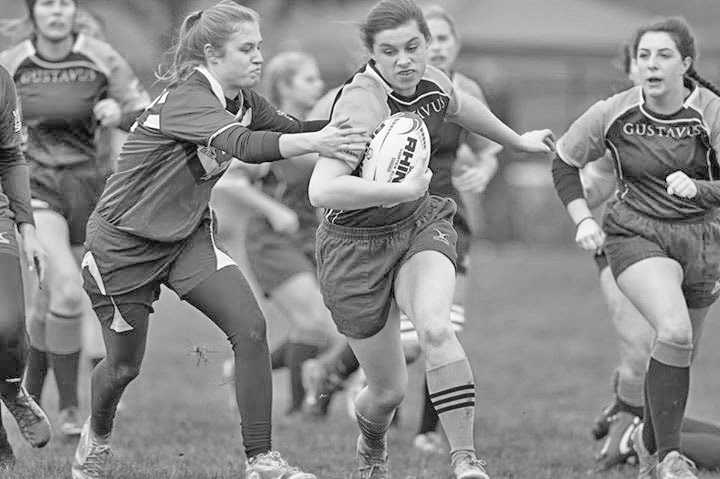In recent years, club sports at Gustavus have been successful. The Women’s Rugby team placed fourth in the nation in the fall of 2018; the Gustavus Dance Team second at Nationals and the Men’s Rugby team had one of their most successful playoff runs yet in the fall of 2019.
Yet, the club sports that potentially need the most attention are not allowed to access the athletic trainers at Gustavus. When most people think of rugby, they think of broken bones, bloody noses and torn ligaments. So if that is the picture people have of rugby in their head, why do the athletes at Gustavus not have access to athletic trainers?
The likely reason is funding: we are not an NCAA team so we do not fall under the athletic trainer’s jurisdiction. This makes sense, but is challenged when other teams in our conference are required to have athletic trainers at every match. If there is not one present, we do not play.
Being that we are not varsity teams, I do not expect athletic trainers to be present at practices like they are for most varsity sports, but simply be present–or on call–for matches.
Why is this necessary? During our last home match, one of our captains took a tackle and ended up on the field in excruciating pain. All we had were some ice packs and enough basic knowledge to know that she should not keep playing. She continued walking, albeit painfully. Throughout the next few days until she had to go get her injury checked out due to immense pain while sitting down and standing for extended periods of time.
It turns out that she had torn her ACL, meniscus and partially torn her MCL. And she continued to walk on it because there was no one there to tell her otherwise or see the signs for those particular tears.
I’m co-captain of the women’s rugby team, which is one of the highest contact sports there is, and we are without an athletic trainer. We are representing Gustavus and playing a sport, even if we aren’t at the varsity level.
Sometimes, immediate treatment is essential to an injury, and without an athletic trainer, we simply don’t have access to that. It’s hard to explain to parents and other spectators why a player who came off the field injured won’t be helped by Gustavus.
In my own experience, there was recently a game during which I came off the field with three torn ligaments in my knee, only to be left to seek medical attention on my own. This is hard to justify, and there’s a change that needs to be made, Gustavus Women’s Rugby Co-Captain Quinn Bents said.
Further, during one of my first rugby matches, a girl fractured part of her leg to the point where she needed it to be splinted.
But we do not have access to sufficient materials, so we had to splint it with the things we had: t-shirts and a field marker.
She had to sit on the side of the pitch until someone could come to pick her up because there were not enough vehicles to take her to the hospital to get it properly looked at and an ambulance would be too expensive.
Other than accidents such as the ones I listed above, perhaps the most common ailment that requires attention in rugby are concussions. Naturally, in a contact sport that relies so heavily on tackling, these do occur–even more so because we do not wear helmets during matches.
Although we are trained to tackle properly and be tackled properly, mistakes do happen and new players occasionally high tackle and heads hit each other or the ground.
Many players have basic knowledge of concussion symptoms, but there are often occasions where subtler symptoms are missed and players continue to go about their daily life with what could be a severe head injury.
With the aid of athletic trainers, such problems like: continuing to walk on damaged knees, splinting with field marker and living with a concussion could result in less long-standing issues. Concussions could be identified sooner, knees could be saved from harmful walking and legs could be properly splinted.
I truly believe that athletic trainers want to help club sports, especially high-risk ones, but are not able to due to regulations or funding.
But I believe that the well-being of the college’s students should be at the forefront of funding and regulations. Continuing to allow students to go hours, days, or weeks without addressing sports-related injuries does not encourage this.
Club sports are important; they encourage teamwork, provide built-in exercise and develop long-standing friendships. Every sport has some sort of risk, but just because a specific sport is a club team rather than a varsity team should not bar athletes from getting the care they need.
